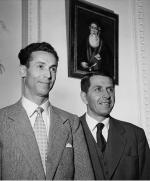Among the French, official and unofficial, whom Buchman's party met was Pierre Chavanne, a young second-generation French settler who farmed 300 hectares - two-thirds grain, one-third fruit - twelve miles outside Marrakesh. His name had been given to Buchman in Caux by an aunt of his. He was concentrating on his own personal and commercial success, an agnostic with Marxist leanings who held liberal views on Moroccan politics. These views, however, had been formed without any personal contact with Moroccans - a not uncommon attitude which created much resentment among educated Moroccans, who felt that even the liberal French were merely exploiting their country. Some of Buchman's party also met a friend of Chavanne, Philippe Lobstein, an inspector of schools at Marrakesh. Like Chavanne a leftist in politics he was, however, a semi-practising Protestant. His wife was Orthodox, and they had emigrated from Alsace in 1948.

Both couples were intrigued, although not convinced, by Buchman's friends. Chavanne only met Buchman himself once in Morocco, outside a hall where both had been attending a lecture on the local situation. 'He was not the kind of great man I was looking for,' says Chavanne. 'I wasn't very impressed with him.' The Chavannes and Lobsteins agreed, however, to meet at Caux the following summer, and there they all decided to experiment with applying Moral Re-Armament in their private and professional lives. This caused them to review not only their personal relationships but also their attitude to Moroccans, and to become as concerned for the future of the country as the Moroccans themselves. Chavanne says, 'I discovered that I was no longer afraid of the Moroccans, and I realised that I had been a liberal out of fear as well as care - the same fear which had made other French become reactionary.'
In the autumn of 1954, soon after their return from Caux, an invasion of locusts threatened to ravage the farmlands around Marrakesh. The Moroccan agricultural services took the necessary action and the danger was averted. Chavanne thanked Ahmed Guessous, the head of the provincial agricultural department, something he says he would never have done without the change he had experienced in Caux. 'You are the first Frenchman who has ever thanked me for anything,' replied Guessous. Chavanne went on, 'I want to apologise for the selfish way I have lived in your country and for my attitude to your people.' He talked of his visit to Caux, and added, 'I have decided now to serve your country on the basis of the standards of Moral Re-Armament.'
449
Photo: Ahmed Guesoous of the Moroccan underground with Pierre Chavanne (right), a French settler.
©Jeremy McCabe LBIPP/MRA Productions